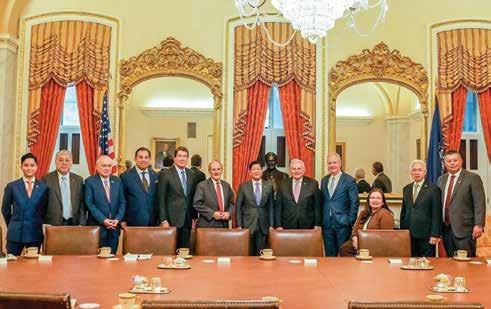
2 minute read
‘There were abuses’ linked to Duterte’s ‘drug war’ - Marcos
by XAVE GREGORIO Philstar.com
MANILA — President Ferdinand "Bongbong"
Advertisement
Marcos Jr. acknowledged that “abuses” did happen during the course of the “war on drugs” waged by his predecessor, former President Rodrigo Duterte.
Marcos said on Thursday, May 4 in Washington that these abuses happened because of the Duterte administration’s focus on law enforcement in combating illegal drugs, which the incumbent president said has been taken “as far as we can.”
“What had happened in the previous administration is that we focused very much on enforcement. And because of that, it could be said there were abuses by certain elements of the government that has caused some concern in many quarters about the human rights situation in the Philippines,” Marcos said at a forum hosted by the Center for Strategic and
International Studies.
Domestic processes on 'drug war' cases
While this is the farthest that Marcos has come in acknowledging the reported abuses in Duterte's “war on drugs,” his administration still refuses to cooperate with the International Criminal Court that is investigating crimes against humanity allegedly committed during the anti-drug campaign.
The Marcos administration, however, has sent communications with the ICC including appeals against decisions it deems unfavorable to the Philippines and requests to suspend and scrap its investigation altogether. But that was until Marcos said in March that the country is “disengaging” with the international tribunal. No submissions from the Philippine government have come forth since then, but the Department of Foreign Affairs, in a letter to the Senate justice committee, cited Marcos’
by DAPHNE GALVEZ Inquirer.net

WASHINGTON D.C. — Pres-
OMICRON variants are killing 200-300 people a day but population immunity in the U.S. is higher and more stable than a year ago.
The Chairman of the Department of Medicine at the University of California San Francisco says the number of new COVID-19 cases is decreasing, wastewater infectiousness is relatively low and hospitalizations are going down.
“The state of COVID, at least as far as I can tell, feels reasonably mild compared to what we’ve seen in the past 3 years, and remarkably stable,” says Dr. Robert Wachter.
Wachter briefed reporters on an Ethnic Media Services conference call last week.
He said the biggest surprise about new variants driving the pandemic in the last 18 months has been the relative lack of surprises.
“We are still on the same Greek letter that
Medi-Cal enrollees: Here’s how to verify your eligibility
IF you are enrolled in Medi-Cal, as more than one-third of Californians are, make sure your county knows how to reach you, or you could lose your health coverage unnecessarily.
You will likely hear and see public messages over the coming weeks urging you to update your contact information. Heed them.
Then, sometime between now and next spring, you’ll probably receive mail from the agency that administers Medi-Cal in your county telling you if you are still eligible for the safety-net health insurance program or asking for more information about your employment status, income, and household size. An information request would likely come in a bright-yellow envelope containing a roughly 20-page form about six weeks before the start of your renewal month.
Be on the alert: Medi-Cal is warning about scammers who have been contacting enrollees









